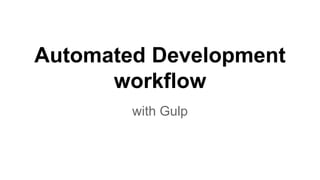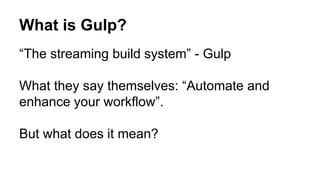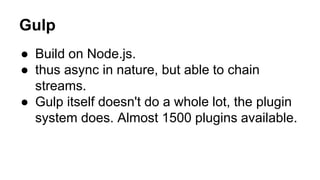Automated Development Workflow with Gulp
- 2. Introduction Name: Kenneth Veldman Front-end Developer at Goldmund, Wyldebeast and Wunderliebe
- 3. Contents ˇń Gulp ˇń Package Managers ˇń Yeoman
- 4. What is Gulp? ˇ°The streaming build systemˇ± - Gulp What they say themselves: ˇ°Automate and enhance your workflowˇ±. But what does it mean?
- 5. Gulp var gulp = require('gulp'); var $ = require('gulp-load-plugins')(); var browserSync = require('browser-sync'); var reload = browserSync.reload; gulp.task('styles', function () { return gulp.src('app/styles/main.scss') .pipe($.sourcemaps.init()) .pipe($.sass({ outputStyle: 'nested', // libsass doesn't support expanded yet precision: 10, includePaths: ['.'], onError: console.error.bind(console, 'Sass error:') })) .pipe($.postcss([ require('autoprefixer-core')({browsers: ['last 1 version']}) ])) .pipe($.sourcemaps.write()) .pipe(gulp.dest('.tmp/styles')) .pipe(reload({stream: true})); });
- 6. Gulp ˇń Build on Node.js. ˇń thus async in nature, but able to chain streams. ˇń Gulp itself doesn't do a whole lot, the plugin system does. Almost 1500 plugins available.
- 7. What do we use Gulp for? - Compile Sass/less - Auto-prefix css - Run jshint on javascript, fail when not passing - collect static files from html, bundle them in separate files: vendor.js, plugins.js, main.js - Minify and uglify the files you want including images! - Collect fonts from bower packages - Serve static templates with a node.js web server, so static templates can be developed separately. - And many many more things you can imagine...
- 8. Demo What does our Gulp setup do? - Save = update - Clean and build (or just build) - Collect static files to minified files
- 9. Package managers ˇń npm (from node.js) ˇń Bower
- 10. Why 2 package managers? npm is used for gulp plugins and other dependencies that are required by node.js bower is used for your requirements, like jQuery and other vendor packages.
- 11. How to install (mac example) 1. Install homebrew (yes, a package manager) 2. Install node.js (yay, free npm to boot!) through homebrew 3. Install bower through npm Yes, we have to install 2 other package managers to install bower...
- 12. Bower components - bootstrap-sass-official - jquery - modernizer
- 13. Bower install How to install a package using bower: $ bower install jquery#1.11.2 Recognizing bower packages on github is easy, look for the `bower.json` file in repos or they just tell you!
- 14. Yeoman So what is Yeoman? ˇ°The web's scaffolding tool for modern webappsˇ± - Yeoman.io
- 15. Yeoman generators Yeoman uses specific generators to make a pre configured setup. These generators act as a pre-config for you project, as simple as: $ yo gulp-webapp
- 16. What does it generate? ˇń Gulp setup ˇđ styles function (minimize + autoprefix) ˇđ jshint for javascript ˇđ html assets collector ˇń Bower packages Optionally: ˇń modernizer ˇń sass ˇń boostrap
- 17. Demo Generating our previous gulp setup with yeoman.
- 18. Available generators Yeoman themselves offer quite a bunch of generators and everything on github that has the ˇ°yeoman-generatorˇ± keyword will be listed on their website! See: http://yeoman.io/generators/
- 19. Making your own Generator Although there are many generators available, often times you want your own setup. Tutorial http://yeoman.io/authoring/
- 20. Advantages The advantages of using Yeoman + Gulp and various other tools is that it actually does what it says: Yeoman is a scaffolding tool that letˇŻs you generate a gulp setup. With that setup you can automate and enhance your workflow with their streaming build system.
- 21. Questions? REFRAIN = ''' %d bottles of beer on the wall, %d bottles of beer, take one down, pass it around, %d bottles of beer on the wall! ''' bottles_of_beer = 99 while bottles_of_beer > 1: print REFRAIN % (bottles_of_beer, bottles_of_beer, bottles_of_beer - 1) bottles_of_beer -= 1




![Gulp
var gulp = require('gulp');
var $ = require('gulp-load-plugins')();
var browserSync = require('browser-sync');
var reload = browserSync.reload;
gulp.task('styles', function () {
return gulp.src('app/styles/main.scss')
.pipe($.sourcemaps.init())
.pipe($.sass({
outputStyle: 'nested', // libsass doesn't support expanded yet
precision: 10,
includePaths: ['.'],
onError: console.error.bind(console, 'Sass error:')
}))
.pipe($.postcss([
require('autoprefixer-core')({browsers: ['last 1 version']})
]))
.pipe($.sourcemaps.write())
.pipe(gulp.dest('.tmp/styles'))
.pipe(reload({stream: true}));
});](https://image.slidesharecdn.com/j69epkiqhw1lzhramfrv-signature-ebbf5ebf73a58ab0a0c50996f1633a77b52153f3faceff936a4a1820665d82e9-poli-150428042052-conversion-gate02/85/Automated-Development-Workflow-with-Gulp-5-320.jpg)















